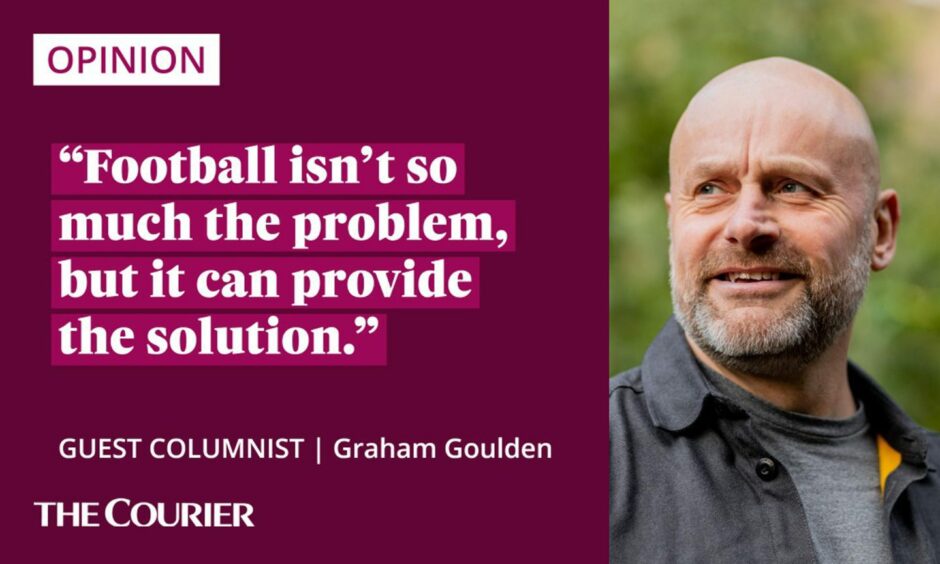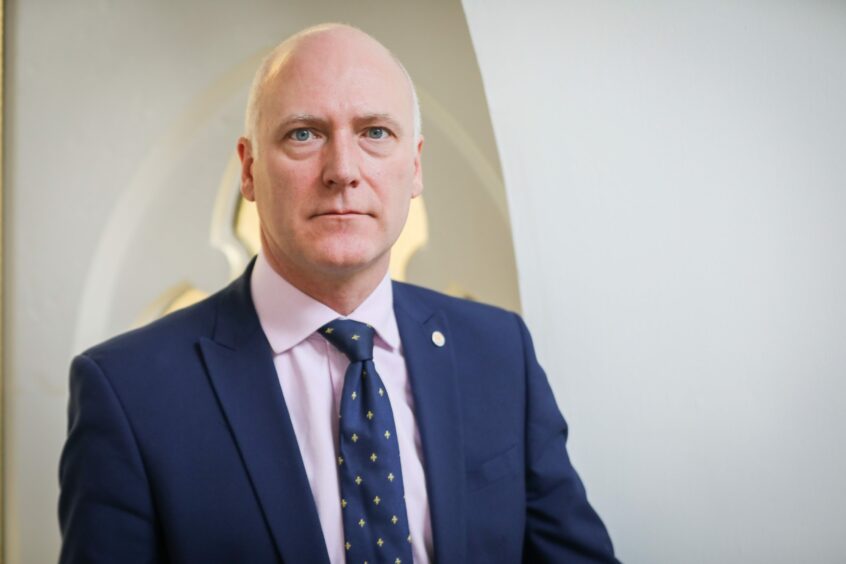Policing taught me many things, but it was the power of community that always shone through.
The prevention of any issue doesn’t start with the police, it starts with each one of us doing what is right.
Sports has always been and always will be at the forefront of social change.
Sport has created togetherness when there has been division. Sport has provided optimism when society needs it most.
Playing sports has helped the UK break down barriers of racism and homophobia.
And sport has also promoted a discussion on men’s role in the prevention of violence against women.

Sport has provided community.
And it is within this sense of community that sport can play a role in addressing the sexist attitudes and behaviours that appear all too common in our national game.
The Scottish Football Writers Association had to apologise this week after a speaker’s sexist jokes led to a walk-out at its annual awards dinner
A recent debate on the issue in the Scottish Parliament led by Dundee City West MSP Joe FitzPatrick also made for uncomfortable listening.
However, it was also a conversation that should give us some hope.
I see more stamina, especially from men, to discuss these issues.
The Scottish Football Writers' Association have apologised after keynote speaker Bill Copeland was said to have made racist, sexist and homophobic comments at last night's awards ceremony – resulting in some people leaving the room.#HateWontWin
— Anthony Joseph (@AnthonyRJoseph) May 9, 2022
In my view a debate on sexism being led by a man provides cause for optimism.
Attitudes to sexism are changing in Scottish football
This past year has been both a reachable and teachable moment for men across the UK.
The murder of Sarah Everard at the hands of serving Met police officer Wayne Couzens shocked a nation. But it also created a much-needed conversation around the role of men in addressing sexism, misogyny, and violence in all its forms.
It’s a conversation that men have involved themselves in, which again provides hope for the future.
During the parliamentary debate Joe FitzPatrick said “men specifically” need to change their attitudes to female participation in football.
It’s clear much needs to change in football. But I think attitudes are changing and men are wanting to get more involved.
When Clyde signed David Goodwillie in 2017, they knew he had been branded a rapist by a civil court judge.
We saw some protest at his signing, but the backlash really didn’t come to anything.
Fast forward to 2022 when Goodwillie signed for Raith Rovers and the reaction to his signing was front page news around the UK.
Public opinion was clear. This signing was wrong and the decision by Raith Rovers to terminate Goodwillie’s contract was the correct one.
In a recent Courier article, Zoe Ogilvie, Aberdeen Football Club director, said work was still needed to address sexism in football.
But she also insisted “it’s not all doom and gloom”, adding “there’s never been a more positive time for the women’s game in Scotland”.
Change can come from within communities
I agree. I am under no illusion that issues remain. However, the stamina I mention above provides a road map towards sustainable change for the betterment of the game and Scottish society.
We need to maintain a focus on the positive.
Such an approach empowers others to speak up.
When we don’t know what to do in a situation, we naturally look around to see what other people are doing.
From that we learn what is appropriate, and what is practical.
This is what happens when people #CallItOut. It forces others to see things from a different angle. Yes it’s depressing/frustrating that it needs to be said in 2022…but it’s important to embrace that it will lead to change! pic.twitter.com/phbfdI9IAk
— Jane Lewis (@Jane__Lewis) May 9, 2022
Traditional approaches to behaviour change usually involve an outsider coming in, warning you of the dire consequences of your behaviour and telling you what to do differently.
This approach might feel effective, but it’s not.
It simply communicates that bad behaviour is the norm. Telling people to go against their peer group never works.
Personally, a better strategy is the reverse. Give people credible evidence that among their peers, good behaviour is the social norm.
By creating these conversations within Scottish football, we will help raise awareness of sexism and wider forms of violence against women and girls.
Through this discussion we can safely challenge the thinking of the some, while inspiring leadership from the many.
And importantly we will provide men with the reassurance that friends and team-mates support their own healthy views and attitudes.
This is our way to break the silence on sexism in football
In my last years in policing, working with the Scottish Violence Reduction Unit, I was forced to think differently around violence.
In my view a new lens would not only help address sexism in football but also issues of racism and sectarianism which continue to blight the game in Scotland.
What connects all these social issues is the silence of bystanders.
Building the team will help to make the environment appear less supportive to those who continue to damage the reputation of the game.
As I said prevention starts in a community. Football isn’t so much the problem, but it can provide the solution.
Graham Goulden is an experienced leadership and violence prevention trainer. For 30 years he was a Scottish police officer and chief investigator specialising in criminal investigation, drug investigation, training and crime prevention.














Conversation